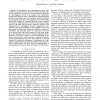Free Online Productivity Tools
i2Speak
i2Symbol
i2OCR
iTex2Img
iWeb2Print
iWeb2Shot
i2Type
iPdf2Split
iPdf2Merge
i2Bopomofo
i2Arabic
i2Style
i2Image
i2PDF
iLatex2Rtf
Sci2ools
CDC
2009
IEEE
2009
IEEE
Input-to-state stability of self-triggered control systems
— Event-triggered and self-triggered control have recently been proposed as an alternative to periodic implementations of feedback control laws over sensor/actuator networks. In event-triggered control, each sensing node continuously monitors the plant in order to determine if fresh information should be transmitted and if the feedback control law should be recomputed. In general, event-triggered control substantially reduces the number of exchanged messages when compared with periodic implementations. However, such energy savings must be contrasted with the energy required to perform local computations. In self-triggered control, computation of the feedback control law is followed by the computation of the next time instant at which fresh information should be sensed and transmitted. Since this time instant is computed as a function of the current state and plant dynamics, it is still much larger than the sampling period used in periodic implementations. Moreover, no energy is spent...
CDC 2009 | Control Systems | Event-triggered Control | Feedback Control Law | Periodic Implementations |
| Added | 21 Jul 2010 |
| Updated | 21 Jul 2010 |
| Type | Conference |
| Year | 2009 |
| Where | CDC |
| Authors | Manuel Mazo, Paulo Tabuada |
Comments (0)

